大学英语精读预备级第三版第九单元教案
[英语学习]大学英语精读 董亚芬主编 第三版 第一册第9单元课件U9
![[英语学习]大学英语精读 董亚芬主编 第三版 第一册第9单元课件U9](https://img.taocdn.com/s3/m/91483fcc76c66137ef06197b.png)
Before Reading
Global Reading Detailed Reading
After Reading
Blank-filling Directions: With the help of the following pictures, listen to the passage and fill in the
大学英语精读董亚芬主编第三版第一册第9单元课件u9
Before Reading
Global Reading Detailed Reading
After Reading
1. Warm-up Questions 2. Word-web 3. Blank-filling 4. Group Discussion 5. Background Information
Form the group of four and discuss on the following topic:
Are we the “masters” of nature, or a part of the natural world?
Clues: We human beings tend to take pride in our “mastery” of nature. We’ve viewed ourselves as “conquerors” of the skies and oceans. We’ve devised ways of using the natural resources of the earth for great profit. In recent years, however, we’ve begun to realize that we are not the masters of the natural world, but a part of it. We’ve also begun to understand that if we do not treat the natural world with great respect, our very existence as a species may be threatened.
电子课件英语第三版Unit9
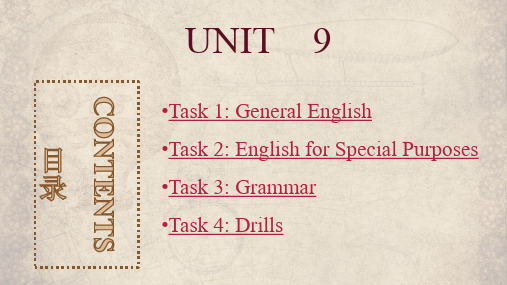
Task 1: General English
New Words and Expressions
obey /.'be./ v. 服从,遵守 subway /'s.bwe./ n. 地铁 expensive /.k'spens.v/ adj. 昂贵的 convenient /k.n'vi.ni.nt/ adj. 便利的,方便的 cause /k..z/ v. 引发 impatient /.m'pe..nt/ adj. 不耐烦的,不耐心的 direction /d.'rek.n/ n. 方向 terrible /'ter.bl/ adj. 极端的,可怕的
Task 2: English for Special Purposes
New Words and Expressions
oppose /.'p..z/ v. 抗拒,反对 degree /d.'ɡri./ n. 度数,度,程度 hardly /'hɑ.dli/ adv. 几乎不 insulator /'.nsjule.t.(r)/ n. 绝缘体 block /bl.k/ n. 块,木块,石块 diode /'da...d/ n. 二极管 allow /.'la./ v. 允许
预备级B1U9 教案
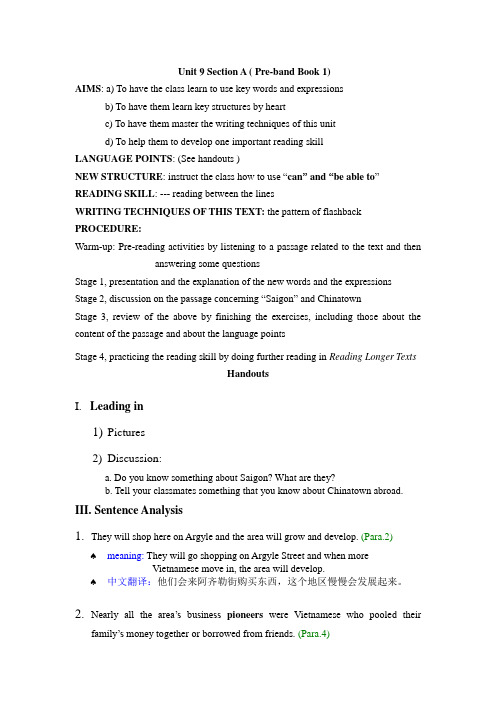
Unit 9 Section A ( Pre-band Book 1)AIMS: a) To have the class learn to use key words and expressionsb) To have them learn key structures by heartc) To have them master the writing techniques of this unitd) To help them to develop one important reading skillLANGUAGE POINTS: (See handouts )NEW STRUCTURE: instruct the class h ow to use “can” and “be able to” READING SKILL: --- reading between the linesWRITING TECHNIQUES OF THIS TEXT: the pattern of flashback PROCEDURE:Warm-up: Pre-reading activities by listening to a passage related to the text and then answering some questionsStage 1, presentation and the explanation of the new words and the expressions Stage 2, discussion on the passage concerning “Saigon” and ChinatownStage 3, review of the above by finishing the exercises, including those about the content of the passage and about the language pointsStage 4, practicing the reading skill by doing further reading in Reading Longer TextsHandoutsI.Leading in1)Pictures2)Discussion:a. Do you know something about Saigon? What are they?b. Tell your classmates something that you know about Chinatown abroad. III. Sentence Analysis1.They will shop here on Argyle and the area will grow and develop. (Para.2)♠meaning: They will go shopping on Argyle Street and when moreVietnamese move in, the area will develop.♠中文翻译:他们会来阿齐勒街购买东西,这个地区慢慢会发展起来。
大学英语精读第三版预备级教案1-6单元

IntensiveReading: Unit2A father, a Son and an Answer
ExtensiveReading: Unit2Culture and Recreation
授课方式
The course emphasizes the application of targeted language skills and English expressions through class activities such as group discussions, answering content-based questions,comparative translationand doing a reasonable amount of drill work both in and outside the classroom. (强调应用)
e the structure learned in this unitbydoing drills anddeveloping astructured mini speech
难点
1.Summarize the content in their own languages.
2.Talk abouttheir own English learning experiences and thencomment
6. Read Text B on their own andwith the teacher’s assistancedo the exercisesattached.
7. Summarize Text B in their own languages.
8.Read the4essays inUnit 1Campus Lifeand answertherelated questions.
大学英语精读预备级unit 9
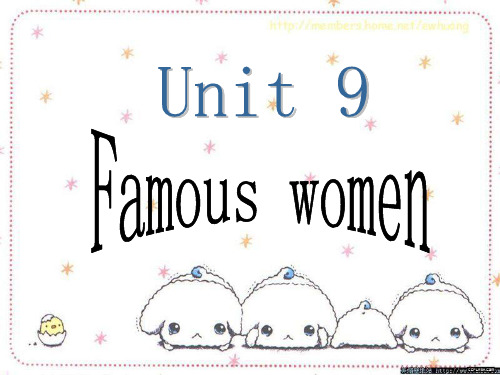
• 由于顺风,她的100米成绩没能被承认为正 式世界纪录。三天后,她轻松在200米比赛 中夺金。最后的4×100米接力,她帮助美 国队在半决赛中就将世界纪录改写为44秒4, 并在决赛中得到了她的第三块奥运金牌。 由于她跑步的姿态优雅,欧洲体赞誉她为 “黑羚羊”。 • 鲁道夫在1962年宣布退役,结束自己的运 动生涯。退役后,鲁道夫从事教练生涯, 并且为穷苦儿童做了大量的工作。1994年 11月12日,54岁的鲁道夫死于脑癌。
She was an American athlete运动员. Rudolph was considered the fastest woman in the world in the 1960s and competed in参加比赛 two Olympic Games, in 1956 and in 1960.
VOA Special English VOA慢速英语
PEOPLE IN AMERICA美国人物 Wilma Rudolph,
1940-1994:
'The Fastest Woman in the World'
VOICE ONE: I’m Steve Ember. VOICE TWO: And I’m Barbara Klein with PEOPLE IN AMERICA in VOA Special English. Today we tell about Wilma Rudolph, the first American woman to win three gold medals in one Olympics. (MUSIC)
• 4. retire from 从……退休 • 5. learn about 获悉,得知 • Learn about other businesses that interest you. • 学习一些你感兴趣的别的行业的事。
大学英语精读第三版第二册教案unit9
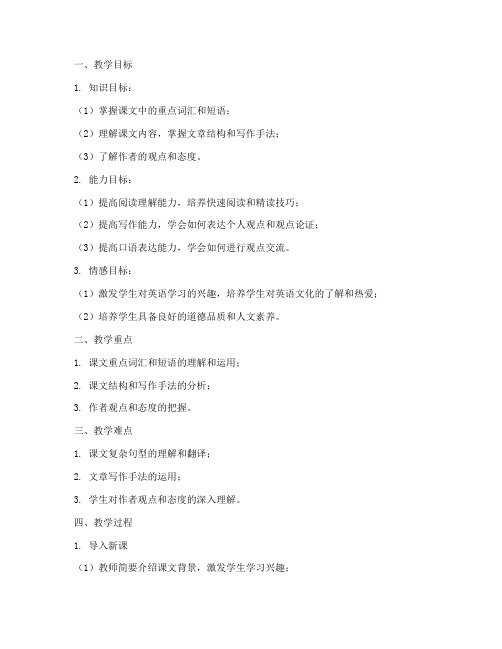
一、教学目标1. 知识目标:(1)掌握课文中的重点词汇和短语;(2)理解课文内容,掌握文章结构和写作手法;(3)了解作者的观点和态度。
2. 能力目标:(1)提高阅读理解能力,培养快速阅读和精读技巧;(2)提高写作能力,学会如何表达个人观点和观点论证;(3)提高口语表达能力,学会如何进行观点交流。
3. 情感目标:(1)激发学生对英语学习的兴趣,培养学生对英语文化的了解和热爱;(2)培养学生具备良好的道德品质和人文素养。
二、教学重点1. 课文重点词汇和短语的理解和运用;2. 课文结构和写作手法的分析;3. 作者观点和态度的把握。
三、教学难点1. 课文复杂句型的理解和翻译;2. 文章写作手法的运用;3. 学生对作者观点和态度的深入理解。
四、教学过程1. 导入新课(1)教师简要介绍课文背景,激发学生学习兴趣;(2)播放与课文相关的图片或视频,引导学生进入学习状态。
2. 课文阅读(1)快速阅读课文,了解文章大意;(2)精读课文,分析文章结构和写作手法;(3)讲解课文中的重点词汇和短语,并举例说明;(4)分析课文中的复杂句型,讲解语法知识。
3. 课堂讨论(1)引导学生讨论课文中的观点和态度,分享自己的看法;(2)针对课文中的难点,进行深入讨论和解析;(3)组织学生进行角色扮演,提高口语表达能力。
4. 课后作业(1)布置课后阅读任务,要求学生完成;(2)要求学生撰写一篇关于课文主题的短文,进行观点表达和论证;(3)布置口语练习任务,要求学生在课后进行口语交流。
5. 课堂小结(1)总结本节课的重点内容,强调学习方法和技巧;(2)鼓励学生在课后继续学习,提高英语水平。
五、教学反思1. 教师要关注学生的学习情况,针对不同学生的学习特点,调整教学策略;2. 在教学中,注重培养学生的阅读、写作和口语表达能力;3. 鼓励学生积极参与课堂讨论,培养学生的思辨能力和团队合作精神;4. 注重培养学生的道德品质和人文素养,提高学生的综合素质。
大学英语精读Unit9 What is happiness课件
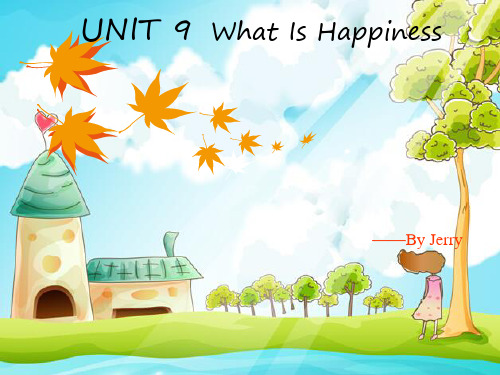
1. Happiness is when what you think, what you say, and what you do are in harmony. ——Mahatma Gandhi
2. Happiness is that state of consciousness which proceeds from the achievement of one’s values. ——Any Rand
愿你有一个灿烂的前程 愿你有情人终成眷属 愿你在尘世获得幸福 我只愿面朝大海,春暖花开
Definitions of Happiness
What’s Happiness?
Mother's Love
At childhood , mother's embrace is the most beautiful paradise.
明天将是你的第一天
.if you'd like to work here as a broker. 如果你想在这里做经纪人的 话 Would you like that,Chris? 你愿意吗,克里斯?
Chris:Yes,sir. 是的,先生 。
Mr.Frohm:Good. We couldn't be happier. 好极了,我们太高兴了
This definition is a good starting point and we can dig deeper from it. The best way to do that is to consult some of the greatest minds in history. So we researched what these people say about Happiness and found 10 essential definitions. Each of them has deep meaning. Take your time to absorb it.
英语预备级UNIT 9导学案
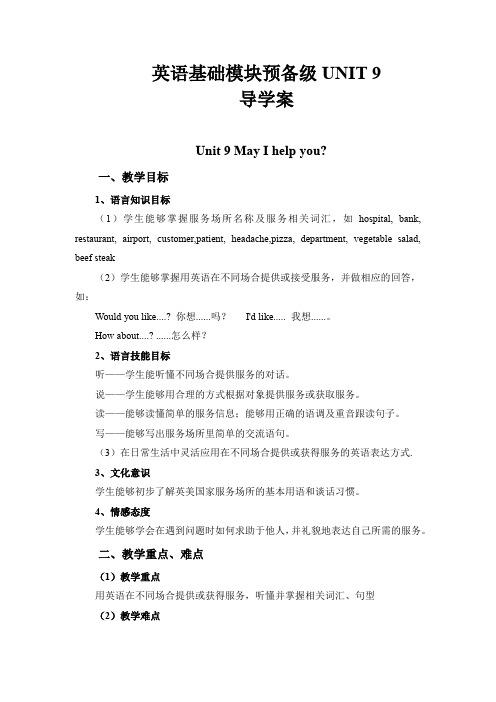
英语基础模块预备级UNIT 9导学案Unit 9 May I help you?一、教学目标1、语言知识目标(1)学生能够掌握服务场所名称及服务相关词汇,如hospital, bank, restaurant, airport, customer,patient, headache,pizza, department, vegetable salad, beef steak(2)学生能够掌握用英语在不同场合提供或接受服务,并做相应的回答,如:Would you like....? 你想......吗?I'd like..... 我想......。
How about....? ......怎么样?2、语言技能目标听——学生能听懂不同场合提供服务的对话。
说——学生能够用合理的方式根据对象提供服务或获取服务。
读——能够读懂简单的服务信息;能够用正确的语调及重音跟读句子。
写——能够写出服务场所里简单的交流语句。
(3)在日常生活中灵活应用在不同场合提供或获得服务的英语表达方式.3、文化意识学生能够初步了解英美国家服务场所的基本用语和谈话习惯。
4、情感态度学生能够学会在遇到问题时如何求助于他人,并礼貌地表达自己所需的服务。
二、教学重点、难点(1)教学重点用英语在不同场合提供或获得服务,听懂并掌握相关词汇、句型(2)教学难点服务场所名称词汇;提供或获得服务及其回答的词汇、句型。
在阅读过程中正确理解并提取相关信息完成任务。
三、教学知识点1、购物用语(1)售货员招呼顾客:在讲英语国家的商店里,售货员见到顾客时常说:May I help you?Can I help you?/What can I do for you?您想买什么?(2)店主或店员想了解顾客想要什么,喜欢什么或向顾客推荐物品时的用语:Which shirt(pen…)do you like? 你想买哪一种衬衫(笔…)?What size(colour,kind…)do you want? 你想买哪种型号(颜色,种类…)?Do you like this size(colour,kind…)? 你喜欢这种型号(颜色,种类…)吗?Is this(Are these)all right? 这个(这些)可以吗?What about these(those)? 这些(那些)怎么样?What else would you like? 你想要点什么?(3)顾客告诉售货员想买什么:如果顾客需要购物可以说:Can you show me…? 你能给我看看…吗?Can you show me a shirt?可以把衬衫给我看看吗?I would like(want)some…我想买…。
现代大学英语精读三Unit9教案
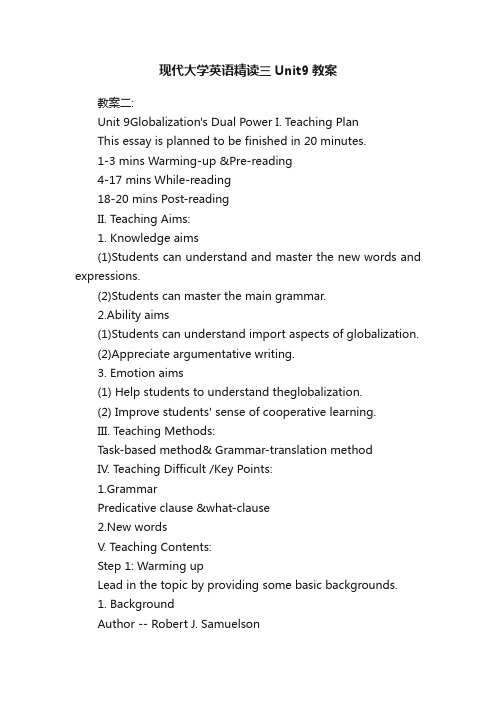
现代大学英语精读三Unit9教案教案二:Unit 9Globalization's Dual Power I. Teaching PlanThis essay is planned to be finished in 20 minutes.1-3 mins Warming-up &Pre-reading4-17 mins While-reading18-20 mins Post-readingII. Teaching Aims:1. Knowledge aims(1)Students can understand and master the new words and expressions.(2)Students can master the main grammar.2.Ability aims(1)Students can understand import aspects of globalization.(2)Appreciate argumentative writing.3. Emotion aims(1) Help students to understand theglobalization.(2) Improve students' sense of cooperative learning.III. Teaching Methods:Task-based method& Grammar-translation methodIV. Teaching Difficult /Key Points:1.GrammarPredicative clause &what-clause2.New wordsV. Teaching Contents:Step 1: Warming upLead in the topic by providing some basic backgrounds.1. BackgroundAuthor -- Robert J. SamuelsonRobert J. Samuelson is a Newsweek contributing editor and The Washington Post Columnist. An economicsspecialist, he is one of the most widely read journalist in the United States. Samuelson's column draws a lot of attention and is frequently cited. The present essay appeared in the International Herald Tribune in December, 1999, on the threshold of the new millennium.(Justification:Help students to know about the author and understand the essay better.) Step 2: Pre-readingAsk students to have a free talk:1.Which signs of globalization you find around you?2.What do you think about these signs?(Justification:Arouse interest of students.)Step 3: While-reading1.New Words(1)Complement v. to make a good combination with sb. or sth. elseeg. The company needs employers who complement each other.联想记忆:complement(补充)与compliment(恭维)仅一个字母之差,前者中的e 想象成维生素E,即补充维生素E;后者中的i像一支燃烧的蜡烛,即拿着蜡烛在神灵面前恭维。
大学英语精读第三册Lesson 9

Vocabulary
1. acquisition [,æ kwɪ'zɪʃən] n. (1) the act of gaining possession of sth. in addition to the company’s property 购置, 购置物 /c u/ e.g. They have made acquisitions in several EU countries. 购买了一些产业 e.g. the acquisition of share by employees 雇员购股 (2) the act of getting sth., esp. knowledge, a skill etc. (知识、技能等的)获得,得到 e.g. language acquisition 语言习得 v. acquire
W B T L E
To be continued on the next page.
Lesson 8—Globalization’s Dual Power
II. Hand in Hand
We can see the five in the sky We feel the ____of our hearts together This is our time to ____ above We know the _____ is here to live forever For all time (Reffrain:) beating rise chance stand
8.depart v. (1) leave someplace and start a trip to another place • e.g. In the morning Mr. McDonald departed for Sydney. (2) do sth. in an unusual and unexpected way • e.g. The new method departs from the old in all respects. • 这种新方法与旧方法在各个方面都不同
大学英语精读第三册unit9教案

教学目标:1. 理解课文主题,提高学生对社会现象的观察和分析能力。
2. 培养学生阅读长篇文章的能力,学会抓住文章的主旨和关键信息。
3. 提高学生的词汇量,掌握相关句型和表达方式。
4. 培养学生进行批判性思考,敢于表达自己的观点。
教学内容:1. 课文内容:A Song of Defiance(反抗之歌)2. 课文分析:文章结构、主题思想、人物性格、修辞手法等。
3. 课后练习:词汇、语法、阅读理解、写作等。
教学步骤:一、导入1. 提问:同学们,你们知道什么是“反抗”吗?请举例说明。
2. 引导学生思考:反抗是一种怎样的行为?它有什么样的意义?二、课文讲解1. 阅读课文,让学生了解文章的基本内容。
2. 分析文章结构,引导学生掌握文章的写作技巧。
3. 讲解课文中的重点词汇和句型,如:defiance、challenge、resistance等。
4. 分析人物性格,引导学生思考人物行为背后的原因。
三、课文讨论1. 提问:文章中的主人公是如何反抗的?你认为他的反抗行为合理吗?2. 引导学生分组讨论,分享自己的观点和看法。
3. 各小组派代表发言,其他同学进行补充和反驳。
四、课后练习1. 词汇练习:让学生根据课文内容,完成词汇填空、选择、翻译等练习。
2. 语法练习:让学生完成相关的语法练习,巩固所学语法知识。
3. 阅读理解:让学生阅读相关文章,提高阅读理解能力。
4. 写作练习:让学生根据课文内容,写一篇短文,表达自己的观点。
五、总结1. 回顾本节课的学习内容,总结重点词汇、句型和写作技巧。
2. 强调学生在学习过程中要注重批判性思考,敢于表达自己的观点。
教学评价:1. 学生对课文内容的理解和掌握程度。
2. 学生在课堂讨论中的参与度和发言质量。
3. 学生课后练习的完成情况。
教学资源:1. 教材《大学英语精读第三册》2. 相关词汇和语法资料3. 多媒体教学设备教学反思:1. 教师要关注学生的学习需求,及时调整教学内容和方法。
大学英语精读第三册第三版Unit9
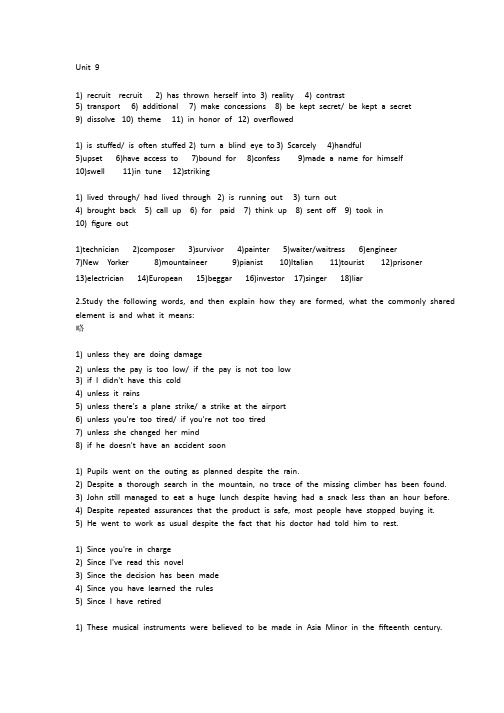
2019-2020年牛津预备级 Unit9教案(专用格式)
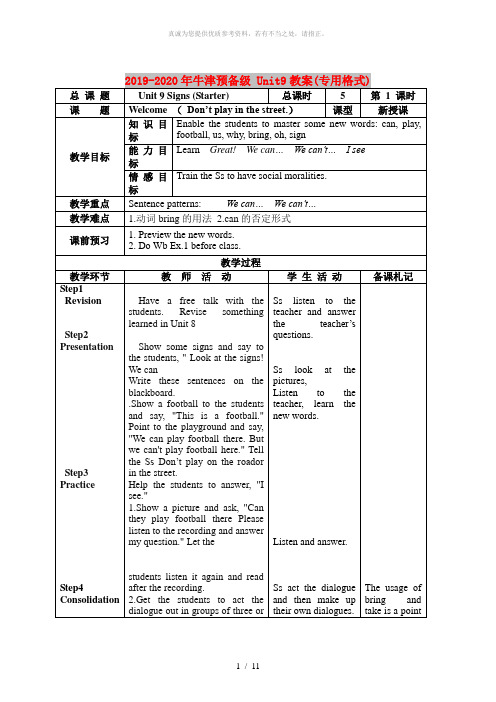
We can’t play games at night.
教学过程
教学环节
教师活动
学生活动
备课札记
Step1 Greetings
Step2 Revision
Step3 Presentation
Step4 Practice
Step morning, class!
How are you today?
1.Ask the students to take out the signs prepared to say something about them. e.g.Look at the signs. Wecanplay football on the playground, but wecan’tplay it in the classroom. Wecanwalk in the park, but wecan’tclimb the hill. Wecanwatch the animals, but wecan’tfeed them. etc.
1. Preview the new words.
2. Do Wb Ex.1 before class.
教学过程
教学环节
教师活动
学生活动
备课札记
Step1
Revision
Step2 Presentation
Step3 Practice
大学英语精读第三册9单元
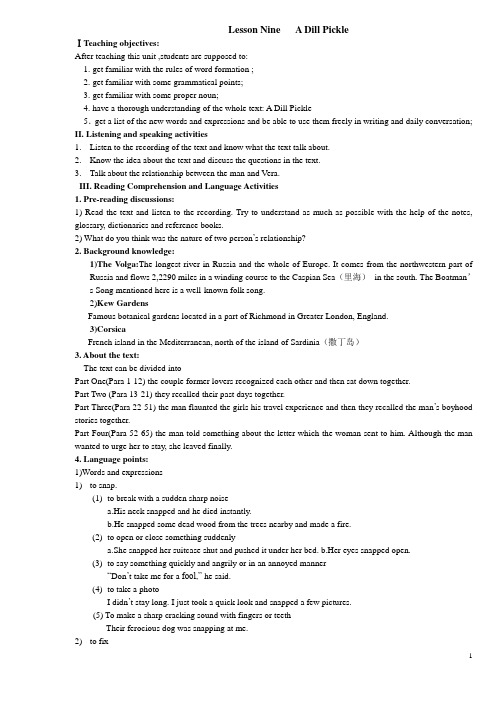
Lesson Nine A Dill PickleⅠTeaching objectives:After teaching this unit ,students are supposed to:1. get familiar with the rules of word formation ;2. get familiar with some grammatical points;3. get familiar with some proper noun;4. have a thorough understanding of the whole text: A Dill Pickle5.get a list of the new words and expressions and be able to use them freely in writing and daily conversation; II. Listening and speaking activities1.Listen to the recording of the text and know what the text talk about.2.Know the idea about the text and discuss the questions in the text.3.Talk about the relationship between the man and Vera.III. Reading Comprehension and Language Activities1. Pre-reading discussions:1) Read the text and listen to the recording. Try to understand as much as possible with the help of the notes, glossary, dictionaries and reference books.2) What do you think was the nature of two person‟s relationship?2. Background knowledge:1)The Volga:The longest river in Russia and the whole of Europe. It comes from the northwestern part ofRussia and flows 2,2290 miles in a winding course to the Caspian Sea(里海)in the south. The Boatman’s Song mentioned here is a well-known folk song.2)Kew GardensFamous botanical gardens located in a part of Richmond in Greater London, England.3)CorsicaFrench island in the Mediterranean, north of the island of Sardinia(撒丁岛)3. About the text:The text can be divided intoPart One(Para 1-12) the couple former lovers recognized each other and then sat down together.Part Two (Para 13-21) they recalled their past days together.Part Three(Para 22-51) the man flaunted the girls his travel experience and then they recalled the man‟s boyhood stories together.Part Four(Para 52-65) the man told something about the letter which the woman sent to him. Although the man wanted to urge her to stay, she leaved finally.4. Language points:1)Words and expressions1)to snap.(1)to break with a sudden sharp noisea.His neck snapped and he died instantly.b.He snapped some dead wood from the trees nearby and made a fire.(2)to open or close something suddenlya.She snapped her suitcase shut and pushed it under her bed.b.Her eyes snapped open.(3)to say something quickly and angrily or in an annoyed manner“Don‟t take me for a fool,” he said.(4)to take a photoI didn‟t stay long. I just took a quick look and snapped a few pictures.(5) To make a sharp cracking sound with fingers or teethTheir ferocious dog was snapping at me.(1)to fasten firmlya.The chairs are all fixed to the floor.b.He looked at me with fixed eyes.(2)to arrangeWe have not yet fixed the meeting.(3)to repair or curea.The radiator of my car is leaking. I‟ve got to get it fixed right away.b.The doctor said that he could fix my broken nose.Fix n. An awkward and difficult positionHis wife divorced him, and his son is only three. He is now a terrible fix.3)Apart adv.(1)separate by a distancea.The two schools are only a few blocks apart.b.They are now living apart.c.They are worlds apart in personality.(2)into partsYou need special equipment to take this machine apart.Other useful expressions: to tell apart, to pull apart, to drift apart, to fall apart,to come apart, to grow apart2)Grammatical points and structure﹡He was peeling an orange.To peel an orange: to take off the peel of an orange.To peel potatoes; to husk剥去...的皮[壳] the rice; to shell the peas去壳除去…的壳;剥…外皮;shell oysters.剥牡蛎; to weed the garden给花园除杂草; to gut取出内脏the fish; to dust掸掉...上的灰尘the tables.﹡Won’t you smoke? 3An invitation: Won’t you sit down? Won’t you come in? Won’t you have some coffee?﹡But she was thinking how well she remembered that trick of his—the trick of interrupting her—and of how it used to exasperate her six years ago. (12)To exasperate: to annoy, to vex, to irritate very much.﹡I am still just as ignorant for all your telling me. (13)For all: in spite of all.For all our efforts, we still couldn‟t’t save his life.For all his power, he is still the most despised person﹡His was the truer.15The Johnsons have two daughters. Tina was the more intelligent.﹡And in the warmth, as it were, another memory unfolded.﹡As it were: as if; as you might say; so to speak.﹡Apart from them, with his supper in a cloth on his knees, sat the coachman.Apart from:(here)some distance away from.It is a bit colder in winter, but apart from (except) that, it’s quite a pleasant city to live in.Apart from (Besides)these reasons, there is yet another factor.A cloth: cloth is usually uncountable unless it refers to a piece of this material for special purpose such as a table cloth or a dish cloth﹡Antonomasia(换称)换称中的专有名词通常有三种来源:宗教,古代及当代的历史和文学。
预备课程Unit 9 教案

牛津英语七年级|预备课程Unit9 Signs一、教学内容词汇:can, play, football, us, why, sign, bring, oh, watch, TV, listen, music, fly, ride, smoke, eat, homework, Internet, write, shout, newspaper, light, cros s, must, wait, park, right, supermarket, into, now, use, shopping basket, sure, put, over, first句型:We can (can't) play football there. Can I bring my bag here? Yes, you can. / No, you can't. Let's go. She must wait for the green light. She must not brin g her bag into the supermarket.二、教学目标和要求1. 掌握四会词汇和重点句型 .2. 学会使用情态动词can and must.3. 掌握一些动词短语 .4. 了解一些交通规那么 .三.教学步骤Step1 Revision1. 默写Unit8的四会单词和句型 .2. 复习Unit8 的重点内容 .Step2 Presentation上课时 ,出示一些图片或简笔图 ,让学生猜猜图中的意思 .由此引出本单元的can、can't、must与mustn't的句型 ,通过举例并结合本单元对话和课文 ,让学生进一步了解情态动词can与must的用法 .详见知识讲解一 .Step3 Practice1.教师可以口头说句子让学生翻译 ,或者学生之间以问答形式做练习 .2. 做能力训练有关情态动词的练习 .四、知识讲解1. 情态动词can 与must的用法 .Can作为情态动词 ,没有人称和数的变化 ,后面直接跟动词原形 ,强调某人做某事的能力 ,还可以用来表示许可 .如:He can answer this questi on. She can't spell the word "dictionary". You can go home now.当can 直接放在句首| ,构成一般疑问句 ,它用来表示向对方提出请求或要求给予许可 ,也可以询问是否有能力做某事 .如:Can you spell it, please? Can I see your new dress, please? Can you count from 1 to 20? 对一般问句Can I/you….?的答复分别是Yes, you/I can. No, you/I can't. must的主要用法与can相似 ,都没有人称和数的变化 ,后面必须接实义动词和be 动词的原形 ,其意义为"必须" ,即"某人必须……" ,它的否认句是在must 后面直接加not, 缩写形式为mustn't, 意思是"禁止 ,不允许" ,一般问句把must提前 ,其他不变 ,简单答复中肯定答复用must, 否认答复都用needn't. 如;You must go home before s upper.2. play的意思是"玩 ,打 ,演奏" ,当它后面是球类词时 ,中间不加任何冠词 ,如:play f ootball, play basketball, play table tennis, play volleyball.而当play后面跟乐器时 ,那么在他们中间加定冠词the, 如:play the piano, play the violin, play the guitar.3. bring与take的区别 .bring 表示"拿来 ,带来" ,指从别处把某人某物带来 .它表示单程 ,与take 相反 ,常和here, to me搭配 .如:Bring your umbrella with you tomorro w. She brought her boyfriend with her.而take表示"拿走 ,带走" ,指把某物从本处拿走 ,或把某人带走 .它指单程 ,与bring相反 ,常和there, to him等搭配 .如:Take th e letter to the post office. I don't know what I should take to the sea when I leave.4. Look at与see 的区别 .前者指集中注意力 ,有意地用眼睛"看" ,强调看的动作 . (它后面跟宾语时要加at ) .如:She looks at herself in the glass.她看到了镜子里的自己 .Look at this carefully, I think it's important.她仔细地看一看 ,我认为这东西很重要 .See 表示"看见" ,是look 的结果 .See通常不用于进行时中 ,而是用can 或could 带动词不定式 .例如:He looked but saw nothing.他看了看 ,但什么也没看到 .I can s ee somebody coming.我看见有人走过来了 .5. find 和look for 都有"寻找"的意思 .Find是个及物动词 ,表示找到 ,主要强调"寻找"的结果 ,而表示"寻找"的过程 .例如:Excuse me, Tom. I can't find the broom.对不起 ,汤姆 ,我找不到扫帚 .Look for 表示"寻找"的过程和动作 .如:What are you looking for?你在找什么? They were looking for their teacher ev erywhere. At last they found him at the library. 他们到处寻找老师 ,最|后在图书馆找到他 .五、能力训练(一 )翻译词组1. 看电视______________2. 听音乐_______________3. 放风筝________________4. 骑自行车___________________5. 在网上查找东西_____________________6. 做家庭作业__ _______________7. 穿过马路_________________8. 在超市前____________________(二 )用情态动词填空 .. Tom____ come to the party tonight, but I'm not sure.3. Can I watch TV now, mum? No, you_______. You_______ do your homework first.4. ______ you ride a bike? No, I can't.5. Must I return the book this morning? No, you________. But you________ return it before supper.6. What_______ can I do for you?7. You _________ park the car in front of the supermarket.8. It's too late. I________ go home.9. I _______ find my new watch now.10. _______ I play computer games first? No, you _________. You _______ clean t he room.11. My mother________ make cakes but my father_______.12. ________ he sing an English song? Yes, he_______.13. ________ I finish my work in twenty minutes? No, you needn't.14. Children ________ play in the road or in the street. It's dangerous.15. You _______ wash your hands before meals. It's good for your health.(三 )单项选择1. - - -__________ I take the newspaper away? - - - -No, you mustn't. You________ read it only here.A. Must, can B. May, can C. Need, must. D. Must, mus t2. This key ___ be Peter's. His is still in the lock.A. may not B. can't C. mus tn't D. needn't3. - - -May I have a look at your letter? - - -No, you _.A. don't B. can't C couldn't D. mustn't4. - - - Must we do some cleaning now? - - -No, you_________. You_______ go ho me.A. mustn't, may B. mustn't, must C. needn't, may D. can't, can5. "_______ you speak English?" "No, I can't."A. Must B. would C. May D. Need6. - - -May I listen to music now, mum? - - -No, you________. You_______ do y our homework first.A. don't, must B. don't, can't C. can't, must D. can't, can7.The traffic_______ stop when the lights are red in the street.A. can't B. don 't have to C. mustn't D. must8. "Mary, ________ that storybook, please." "Sorry, I________ it to the library."A. take, bring B. bring, take C. take, take D. bring, bring9. I _______ the tree, but I _______ nothing.A. look, see B. see, look C. look at, see D. see, look at10. They are _________ their Chinese teacher everywhere. At last they _______ h im in the library.A. looking for, find B. find, look for C. look, find D. find, find11. The girl ________ cross the road. She _______ wait for the greenlight.A. can, must B. must, can't C. can't, must D. must, must12. - - -Is your grandma a doctor? - - - - Yes, ______.A. she is B. he is C. she isn't D. he isn't13. Who ______ the man over there?A. is B. are C. am D. be14. - - -_______ are you from? - - - England.A. Which B. What C. Where D. How15. Is there________ "F" in the word "five"?A. a B. / C. an D. the16. Let me ______ the classroom.A. cleaning B. clean C. to clean D. clear17. There is a sign "________ to music!" near the lake.A. Not listen B. Don't l isten C. No listen D. Not listening18. Can we_______ across the zebra crossing?A. run B. running C. runs D. ran19. Don't _________ your car near the crossing.A. parking B. stopping C. driving D. stop20. ________ some orange juice in the bottle.A. Has B. Have C. There is D. There are(四 )句型转换1. Cross the road now. (改否认句 )______________________2. You can park your car here. (否认句 )_____________________________________3. I can ride my bicycle in the street. (用where 提问 )______________________ _4. You mustn't play on the crossing. (祈使句 )__________________________5. You can meet my family and eat dinner with us. (改为一般疑问句 )___________ __6. We can see some animals in the zoo. (对斜体局部提问 )__________________7. You can come and sit here. (改祈使句 )_____________________________________8. We have twenty colour photos. (对斜体局部提问 )_______________________9. We can look after his baby. (一般疑问句 )________________________________10. There is a glass of coffee in the fridge. (对斜体局部提问 )_______________ ______(五 )翻译句子1. 我们不会踢足球 ,但是我们会打篮球 .________________________2. 他们不会吸烟 ._____________________________3. 她不会把自行车停在那家超市前 .____________________________4. 你不准把书带进图书馆里 ._______________________________5. 你们必须等绿灯亮了才行 ._________________________________________六、课后作业1. 抄写单词三遍并会默写四会单词 .2. 熟读对话和课文 .。
大学英语精读精读第三册Unit 9 Song of Defiance课件

Quantus tremor est futurus, Quando Judex est venturus, Cuncta stricte discussurus! 将会有何等的畏怖 当审判者从天而降 严苛地裁判万物!
Auschwitz
Dachau
Isaacson Haosen camp
自1981年问世的“德军总部”;由 Muse Software公司研发;Apple II平台发售
战地1是由美国的EA DICE工作室 在2016年发行的游戏,虽然是以 一战作为背景,但带来的真实的 战争体验却是无可比拟的。
Unit 9 Song of Defiance
Can songs give people strength when they are fighting injustice? If you think they can ,give one or two examples.
Can art be used to disguise criticism of those in power?
奥斯维辛集中营是纳粹 德国时期建立的劳动营 和灭绝营之一,有“死 亡工厂”之称。营内设 有四个大规模杀人的毒 气“浴室”、储尸窖和 焚尸炉,一次可屠杀 12,000人,配备的焚尸 炉每天可焚烧8,000具尸 体。比克瑙有四间毒气 室,曾创造过每天毒死 6000人的纪录。在奥斯 威辛集中营存在的4年多 期间,先后关押过数百 万人!其中有120万到 150万人在这里丧生。
What do you know about how the Jews were treated by the Nazis in World War II?
大学英语精读第三版第二册教案_Unit9
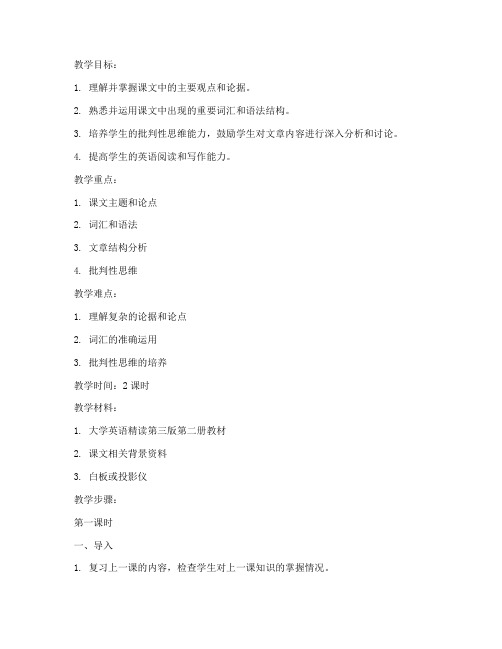
教学目标:1. 理解并掌握课文中的主要观点和论据。
2. 熟悉并运用课文中出现的重要词汇和语法结构。
3. 培养学生的批判性思维能力,鼓励学生对文章内容进行深入分析和讨论。
4. 提高学生的英语阅读和写作能力。
教学重点:1. 课文主题和论点2. 词汇和语法3. 文章结构分析4. 批判性思维教学难点:1. 理解复杂的论据和论点2. 词汇的准确运用3. 批判性思维的培养教学时间:2课时教学材料:1. 大学英语精读第三版第二册教材2. 课文相关背景资料3. 白板或投影仪教学步骤:第一课时一、导入1. 复习上一课的内容,检查学生对上一课知识的掌握情况。
2. 引导学生讨论与课文主题相关的话题,激发学生的学习兴趣。
二、课文精读1. 学生自读课文,理解课文大意。
2. 教师讲解课文中的生词、短语和语法点。
3. 分析课文结构,帮助学生掌握文章的组织方式。
三、课堂讨论1. 引导学生讨论课文中的论点,分析作者的论证过程。
2. 鼓励学生提出自己的观点,培养学生的批判性思维能力。
四、词汇练习1. 教师布置与课文相关的词汇练习,巩固学生对词汇的掌握。
2. 学生完成练习,教师检查并讲解答案。
第二课时一、复习1. 复习上一课的内容,检查学生对上一课知识的掌握情况。
2. 学生分享在课堂讨论中的观点,教师点评。
二、阅读练习1. 学生自读课文,完成阅读练习,巩固对课文内容的理解。
2. 教师讲解阅读练习的答案,分析文章的细节和隐含意义。
三、写作练习1. 学生根据课文内容,撰写一篇短文,要求包括引言、主体和结论三个部分。
2. 教师批改学生的作文,给予指导和反馈。
四、总结1. 教师总结本节课的教学内容,强调重点和难点。
2. 学生分享学习心得,教师点评。
教学反思:1. 关注学生的个体差异,针对不同学生的学习情况给予个性化指导。
2. 创设轻松、愉快的课堂氛围,激发学生的学习兴趣。
3. 注重培养学生的批判性思维能力,提高学生的英语综合运用能力。
大学英语精读预备级第三版第九单元教案
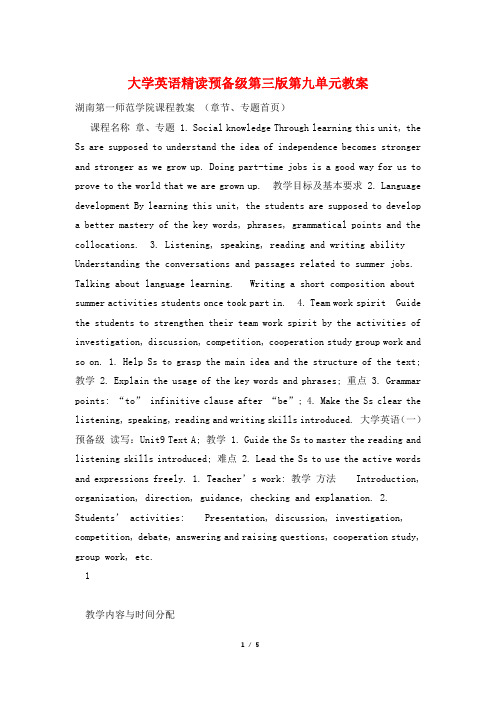
大学英语精读预备级第三版第九单元教案湖南第一师范学院课程教案(章节、专题首页)课程名称章、专题 1. Social knowledge Through learning this unit, the Ss are supposed to understand the idea of independence becomes stronger and stronger as we grow up. Doing part-time jobs is a good way for us to prove to the world that we are grown up. 教学目标及基本要求 2. Language development By learning this unit, the students are supposed to develop a better mastery of the key words, phrases, grammatical points and the collocations. 3. Listening, speaking, reading and writing ability Understanding the conversations and passages related to summer jobs. Talking about language learning. Writing a short composition about summer activities students once took part in. 4. Team work spirit Guide the students to strengthen their team work spirit by the activities of investigation, discussion, competition, cooperation study group work and so on. 1. Help Ss to grasp the main idea and the structure of the text; 教学 2. Explain the usage of the key words and phrases; 重点 3. Grammar points: “to” infinitive clause after “be”; 4. Make the Ss clear the listening, speaking, reading and writing skills introduced. 大学英语(一)预备级读写:Unit9 Text A; 教学 1. Guide the Ss to master the reading and listening skills introduced; 难点 2. Lead the Ss to use the active words and expressions freely. 1. Teacher’s work: 教学方法 Introduction, organization, direction, guidance, checking and explanation. 2. Students’ activities: Presentation, discussion, investigation, competition, debate, answering and raising questions, cooperation study, group work, etc.1教学内容与时间分配The 1st and 2nd period: Warming up exercises; Text A (cultural background, global reading; words and expressions(finish vocabulary activities on page154) ) The 3rd and 4th period: Detailed Reading (Text A: reading skills, text study, notes to the text, summary of the text) Text A’s exercises2湖南省第一师范学校课程教案(分页)课程名称大学英语(一)预备级授课内容 Unit 9 Famous Women The 1st and 2nd period (第1,2课时) Key points: 1) Let the Ss know the learning objectives of this unit; 2) Help the Ss understand the text as a whole and know some background knowledge; 3) Have the Ss get some idea of how to deal with the problems occurred in language learning; 4) Guide the Ss use the new words and expressions freely. Difficult points: Make the Ss use freely some of the active words, expressions, key grammatical points and sentence patterns in this text. Teaching procedures: Step1 Warming up 1. Introductory Remark Eleanor Roosevelt said, “You gain strength, courage, and confidence by every experience in which you stop to look fear in the face. You must do the thing which you think you cannot do.” Wilma Rudolph lived up to Eleanor’s idea and she is a great example for all of us. 2. Lead-in Discussion: Group One: Do you think it more difficult for women to succeed in our society? Group Two: Do you think women can hold up half the sky? Group Three: What difficulties are likely to face women when they try to advance their career? Step2 Background introduction Famous woman: WilmaRudolph was the first American woman runner to win three gold medals in the Olympic Games. Her performance was all the more remarkable in light of the fact that she could not walk without braces(支架) until age 11. Wilma Rudolph Foundation was founded in Indianapolis in 1982 by Wilma Rudolph to encourage community-based track and field programs and to nurture young athletes and to teach them that they, too, can succeed despite all odds(逆境 ) against them. Step 3 Global reading3Read the passage very quickly and answer questions on page125: speaking activity 3. Step 4 New words & phrases learning Voiced reading Key words: Nouns: polio, porter, maid, treatment, massage, coach, medal, relay, ankle, foundation, discipline, cancer, influence Verbs: suffer, rub, support, encourage, ignore, retire Adjectives: gloomy, barefooted, senior, make matters worse, qualify for, make matters worse: make an already difficult situation more difficult Her attempts to calm them down only made matters worse. There’s no point arguing with him; it will only make matters worse. afford:买得起;担负得起;提供;给予 He even couldn’t afford a new refrigerator. Love is what we can’t afford to lose. qualify for: 具有……资格 Will our team qualify for the second round? He qualifies for the legal aid. Step 5 assignment Finish exercises from page125 to page128. The 3rd and 4th period (第3,4课时) Key points: 1) 1) Discuss with the Ss about the writing skills text A employed; 2) Have the Ss use freely some of the active words, expressions, key grammatical points and sentence patterns in this text. 3) Guide the Ss to learn to skim and scan a long passage; 4) Do the explanations on the difficult points of the text. Difficult points: 1) Lead the Ss to organize language well while writing; 2) Guide the Ss gets the main idea of each part in their own words. Teaching procedures: Step I.Presentation and homework checking 1. Ask some students to read the new words and expressions loudly. 2. Translate some sentences about the new words and expressions. Detailed Reading ① Ss read the passage paragraph by paragraph and try to grasp the keywords or main idea of 4each paragraph; ②③④ Explain each paragraph sentence by sentence; Ss read the passage again if possible, and try to retell; Explain language points after the comprehension of the whole passage. Step2 Text Study: Q: What does Paragraph 1 tell us? A: Wilma Rudolph got a bad disease and couldn’t get good medical care. When Wilma Rudolph was four years old, she had a disease called polio which causes people to be crippled and unable to walk. task: structure analysis To make matters worse, her family was poor and could not afford good medical care. make matters worse: make an already difficult situation more difficult Her attempts to calm them down only made matters worse. There’s no point arguing with him; it will only make matters worse. afford:买得起;担负得起;提供;给予 He even couldn’t afford a new refrigerator. Love is what we can’t afford to lose. Q: What’s the main idea of this paragraph? A: Her family tried their best to help her. It didn’t help, but the doctors said she needed to give Wilmaa massage every day by rubbing her legs. Q: What does “it” refer to? A: The treatment. Task: structure analysis & Exercise on Page127 Q: What do Para. 3-4 tell us? A: By and by she could play basketball. Three years later, her mother came home to find her playing basketball by herself barefooted. Q: What’s the function of “barefooted”? A: adverbial Task: Exercise(p126-127) Q: What do Para. 5-7 talk about? A: With the encouragement of a track coach, she qualified for the Olympic Games and won 35gold medals. She ran so well that during her senior year in high school, she qualified for the 1956 Olympics in Melbourne, Australia. qualify for: 具有……资格 Will our team qualify for the second round? He qualifies for the legal aid. Q: What’s the main idea of these two paragraphs? She retired from running and started Wilma Rudolph Foundation. Translation: Wilma thought that God had a greater purpose for her than to win three gold medals. A: 除了赢得三枚金牌外,上帝还赋予她的人生更远大的目标。
大学英语精读第三版第二册unit9教案

课时:2课时教学目标:1. 理解课文内容,掌握课文背景知识;2. 熟练运用所学词汇和语法知识;3. 培养学生的阅读理解能力和英语写作能力;4. 培养学生表达观点和批判性思维能力。
教学重点:1. 课文内容的理解;2. 词汇和语法知识的运用;3. 阅读理解和写作能力的培养。
教学难点:1. 课文内容的深入理解;2. 词汇和语法知识的灵活运用;3. 写作能力的提升。
教学过程:第一课时一、导入1. 复习上节课所学内容;2. 提问:What do you think of the topic of this unit?二、课文精读1. 阅读课文,了解课文大意;2. 分析课文结构,划分段落;3. 讨论课文中的重点词汇和短语;4. 分析课文中的语法结构;5. 赏析课文中的精彩语句。
三、课堂讨论1. 讨论课文中的主题思想;2. 分析作者的观点和态度;3. 结合自身经历,谈谈对课文主题的看法。
四、练习解析1. 完成课后练习题;2. 分析练习题的答案和解题思路;3. 针对错误进行讲解和纠正。
第二课时一、复习导入1. 复习上节课所学内容;2. 提问:What did you learn from this unit?二、课文拓展1. 阅读课文相关背景资料;2. 分析课文中的文化差异;3. 结合自身经历,谈谈对课文主题的感悟。
三、写作训练1. 选取课文中的一个话题,要求学生用英语写一篇短文;2. 学生完成写作任务;3. 互相批改作文,并提出修改意见。
四、课堂总结1. 总结本节课所学内容;2. 强调课文重点词汇和语法知识;3. 鼓励学生在课后继续学习和巩固所学知识。
教学反思:1. 关注学生的学习情况,及时调整教学策略;2. 注重培养学生的阅读理解和写作能力;3. 鼓励学生积极参与课堂讨论,提高学生的英语表达能力。
大学英语精读第三版第二册U9教案
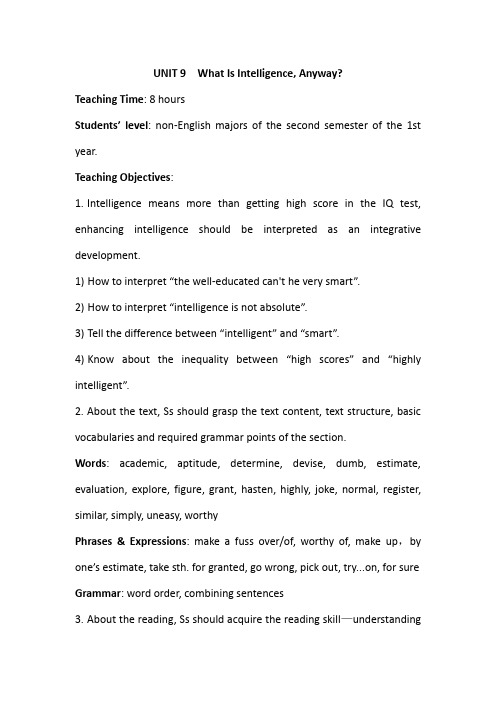
UNIT 9 What Is Intelligence, Anyway?Teaching Time: 8 hoursStudents’ level: non-English majors of the second semester of the 1st year.Teaching Objectives:1.Intelligence means more than getting high score in the IQ test, enhancing intelligence should be interpreted as an integrative development.1)How to interpret “the well-educated can't he very smart”.2)How to interpret “intelligence is not absolute”.3)Tell the difference between “intelligent” and “smart”.4)Know about the inequality between “high scores” and “highly intelligent”.2.About the text, Ss should grasp the text content, text structure, basic vocabularies and required grammar points of the section.Words: academic, aptitude, determine, devise, dumb, estimate, evaluation, explore, figure, grant, hasten, highly, joke, normal, register, similar, simply, uneasy, worthyPhrases & Expressions: make a fuss over/of, worthy of, make up,by one’s estimate, take sth. for granted, go wrong, pick out, try...on, for sure Grammar: word order, combining sentences3.About the reading, Ss should acquire the reading skill—understandingthe figurative language.4.About the writing, Ss should get to grasp the skill of transition.5.About the listening, Ss finish Unit 9 directed by the teacher. Teaching Procedures:I.Pre-reading Activities1. Background information: author, intelligence test, I.Q., aptitude test2. Introductory remarks:It is hard to answer the question raised by Asimov. There can be quite a few different answers to it. As we know, somebody who scores high on paper tests might work poorly with his hands. Someone who may not be a top student at school succeeds in a career after school. He is not intelligent but smart. The author of this article is highly educated. But is he really intelligent? Let's see what his interpretation is.3.Warm-up questions(1) What is an intelligence test?(2) Some people maintain that IQ tests are just for fun. Others argue that they are indeed testing man’s intelligence. What’s your opinion?(3) Do you agree that the more education one receives, the more intelligent he becomes?(4) What other factors besides IQ do you think are equally or even more important for a person to be successful? Give your reasons.4.Key words and expressions:1)aptitude:natural ability or skillExample: She has an aptitude for dealing with people.Make the students notice the spelling form of following three words: aptitude; altitude; attitude2)figure:a) number, symbol for a number, esp. 0 to 9Example: She got a starting salary of six figures.b) shape or outline of sb. or sth.Example: 1 saw a figure 20 feet away from me in the dim street light.c) important personExample: The young students argued over who was the most influential figure in the 20th century.d) human formExample: The fashion model exercises daily to keep her figure.e) diagram; drawing to illustrate sth.Example: The figures in the book will help you understand the theories better.3)register:a)v. write in a list or recordExample: The old church hooks registered all the births, marriages and deaths in this small town.b)n. record or listExample: You might find some Chinese names on the US immigration register of the 19lh century.4)highly:in or to a high degreeExample: It is highly probable that he changed his name to avoid being tracked down by the police.5)worthy of:deservingExamples:a worthy enemy a worthy causeHe is a poet worthy of the name.The place is worthy of a visit.6)explore:a)search or examine thoroughlyExample: To write his graduation paper the sociology student explored all the major libraries in the city.b)travel into or through a region for the purpose of learning about it Example: A robot was recently sent to explore the surface of Mars.7)suppose:I suggest; ifExample: Suppose we put off the meeting till next week.8)foist on:impose upon by coercion or trickeryExample: Stores should not foist defective goods on customers.9)whereupon:upon that; immediately following thatExample: The unsuspecting teacher pulled out the drawer; whereupon, a dozen frogs leaped out.10)for sure:without doubt; for certain, surely or certainlyExample: I did not know for sure which bus to take.E.g. I also heard that he was involved in the matter but do you know it for sure?b) <set phrases> sure enough to be sure make sureE.g. Sure enough, he won the race.He's not bright, to be sure, but he always works hard.To make sure that the letter was delivered to the address, I registered it.11. normal :a) (n.) the usual state or levelE.g. Sam was scolded because he hot a score below normal in the English mid-term exam.b) (adj.) usual, regularE.g. His behaviors do not seem normal to me.12. simply :adv. a) only, merelyE.g. I took that job simply because the office is near my home.b) in a plain mannerE.g. The old man lives simply and is dressed simply.c) completely, absolutelyE.g. I simply can't understand you.13. estimatea) (n.) judgment or opinion about how much, how many, how good, etc.E.g. They held totally different estimates of her character.b) (v.) form a judgment aboutE.g. The write estimated that she would need three more months to finish her novel.c) <set phrase> by one's estimateE.g. By my estimate, your plan will not work.14. grant:v. a) agree to give, allow (sb.) to have (sth.)E.g. The government granted land to those who were willing to farm it. b) agree (that sth. is true)E.g. I grant that he is intelligent.c) <set phrase> take for granted : regard it as true or as certainE.g. George took for granted all that his parents did for him.15. hastena) (vi.) go fast, be quick to do or say sth.E.g. Finding he was a little late, he hastened to the office.b) (vt.) cause to move with speed, cause sth. to happen quicklyE.g. Chemical fertilizer hastened the growth of plants.c) <derivative> haste : (n.) hurryE.g. They left in great haste.16. determine:a) decide (on)E.g. I found it hard to determine which side was right just by hearing them quarrel.b) find out preciselyE.g. The explorer determined his location by using the compass.c) make up one's mindE.g. He determined to learn how to operate the machine in two days' time.17. jokea) (n.) sth. said or done to cause amusementE.g. Don't play jokes on him. He can't take the joke.b) (v.) make jokesE.g. Don't take it seriously. He is only joking with you.18. dumb :adj. a) unable to speakE.g. She was dumb from birth and was very kind to dumb animalsb) temporarily silentE.g. The audience was struck dumb when the magician ate fire.19. smart :adj. a) cleverE.g. This is a smart answer.b) well-dressed, bright and fresh in appearanceE.g. You look smart in this suit.20. make a (big / great) fuss over / about :treat with great or excessive attentionE.g. Grandparents usually make a great fuss over their grandson.22. make upa) put together, prepareE.g. People made up parcels of clothes and sent them to the flood-stricken areas.b) form, constituteE.g. The committee is made up of seven members.c) inventE.g. Bob makes up stories to amuse his little sister.23. pick out :select, choseE.g. It took a long time to pick up a new dress at the store.5.Synonym Discriminationworthy worth worthwhilea) All can be used as an adj.. But Only "worthy" and "worthwhile" can be used as attributive.worthy : deserving respect or honorworthwhile : useful or interesting; worth the time, money or effort spent E.g. He is a worthy gentleman.Certainly, there are many worthwhile programs on TV.b): Worth" and "worthy" can be used as predication.worth + n. / V-ingworthy + of n. / of being done / to be doneE.g. She was not worthy of the honor given to her.This thing is worthy to be done.This thing is worthy of being done.This thing is worth doing.Ⅱ. While-reading Activities1.Ss have the silent reading on the text (10 mins)2.T explains the text in detail.Lines 1--51. Language PointsWhat is intelligence, anyway?a) anyway : in any case ; whateverE.g. That wasn't my fault, anyway.Anyway we choose will involve danger.…against a normal of 100, …a) against : in contrary to / withE.g. We have now 100 machines against 20 five years ago.2. Questions for Discussion(1) What is an aptitude test?---Aptitude test is a kind of test used to predict the future performance of a person in his field of study or work.(2) What are the responsibilities of a KP? Does a KP need high intelligence?---IN the US army, KP is for very low ranking soldiers or sometimes used as punishment. One on KP has to prepare the food and do the washing in the kitchen.(3) Why did the author mention his rank and duty in this paragraph?---He was trying to show that a person's higher score in intelligence test does not necessarily mean he has a higher position or holds more responsibilities in the society.Lines 6--111. Language Pointspeople with intellectual bents similar to mine?a) bent : natural tendency or inclinationE.g. Picasso showed hie bent for arts at a early age.2. Questions for Discussion(1) Do you think a person who scores high in intelligence tests is highly intelligent? Give your reason.---Although the answers require intelligence, the scores do not reflect the real abilities of a person.(2) Do we usually regard people who score high in such tests as being very intelligent?---Yes, and some of them are really intelligent in their daily work and their academic life。
- 1、下载文档前请自行甄别文档内容的完整性,平台不提供额外的编辑、内容补充、找答案等附加服务。
- 2、"仅部分预览"的文档,不可在线预览部分如存在完整性等问题,可反馈申请退款(可完整预览的文档不适用该条件!)。
- 3、如文档侵犯您的权益,请联系客服反馈,我们会尽快为您处理(人工客服工作时间:9:00-18:30)。
The 1stand 2ndperiod: Warming up exercises;Text A(cultural background,global reading;words and expressions(finish vocabulary activities on page154) )
Group Three: What difficulties are likely to face women when they try to advance their career?
Step2Background introduction
Famous woman:Wilma Rudolph was the first American woman runner to win three gold medals in the Olympic Games. Her performance was all the more remarkable in light of the fact that she could not walk without braces(支架) until age 11.
3.Listening, speaking, reading and writing ability
Understanding the conversations and passages related tosummer jobs.
Talking aboutlanguage learning.
Writing ashort composition aboutsummer activities students once took part in.
湖南第一师范学院课程教案
(章节、专题首页)
课程名称
大学英语(一)预备级
章、专题
读写:Unit9Text A;
教学目标及基本要求
1. Social knowledge
Throughlearningthis unit, the Ss are supposed tounderstandtheidea of independence becomes stronger and stronger as we grow up.Doing part-time jobs is a good way for us to prove to the world that we are grown up.
教学
重点
1.HelpSs tograsp the main idea and the structure of the text;
2.Explain the usage ofthe key words and phrases;
3.Grammar points:“to”infinitive clause after“be”;
Adjectives: gloomy, barefooted, senior,make matters worse,qualify for,make matters worse: make an already difficult situation more difficult
Her attempts to calm them down only made matters worse.
教学
方法
1. Teacher’s work:
Introduction, organization, direction, guidance, checking and explanation.
2. Students’ activities:
Presentation,discussion, investigation, competition, debate, answering and raising questions,cooperationstudy,group work, etc.
The 3rdand 4thperiod:Detailed Readingt study, notes
to the text,summary of the text)Text A’s exercises
湖南省第一师范学校课程教案
(分页)
课程名称
大学英语(一)预备级
3Ssreadthepassageagain if possible, and try to retell;
qualify for:具有……资格
Will our team qualify for the second round?
He qualifies for the legal aid.
Step 5 assignment
Finish exercisesfrompage125to page128.
The 3rd and 4th period (第3,4课时)
Difficult points: 1)Lead the Ss to organize language well while writing;
2)Guide the Ssgetsthe main idea of each part in their own words.
Teaching procedures:
Step 3Globalreading
Read the passage very quickly and answer questionson page125: speaking activity 3.
Step 4 New words& phraseslearning
Voiced reading
Key words:
2. Language development
By learning this unit, the students are supposed to develop a better mastery of thekeywords, phrases, grammatical points and the collocations.
4.Make the Ss clear thelistening, speaking, reading and writingskills introduced.
教学
难点
1.GuidetheSs tomaster the readingand listeningskills introduced;
2. LeadtheSs to use theactive words and expressions freely.
DetailedReading
1Ssreadthepassageparagraph by paragraph and try tograspthe keywords or main idea ofeach paragraph;
2Explain each paragraphsentenceby sentence;
授课内容
Unit9Famous Women
The 1stand 2ndperiod(第1,2课时)
Key points: 1)Let the Ss know the learning objectives of this unit;2)Help theSs understand the text as a whole and know some background knowledge; 3) Have theSsget some idea ofhow todeal with the problems occurred in language learning;4) Guidethe Ss usethe new words and expressionsfreely.
StepI. Presentation andhomeworkchecking
1.Ask some students to read the new words and expressions loudly.
2.Translate some sentences about the new words and expressions.
Difficult points:Make the Ss use freely some of the activewords,expressions, key
grammatical pointsand sentencepatterns in this text.
Teaching procedures:
Step1Warming up
1.Introductory Remark
Eleanor Roosevelt said,“You gain strength, courage, and confidence by every experience in which you stop to look fear in the face. You must do the thing which you think you cannot do.”Wilma Rudolph lived up to Eleanor’s idea and she is a great example for all of us.
Wilma Rudolph Foundation was founded in Indianapolis in 1982 by Wilma Rudolph to encourage community-based track and field programs and to nurture young athletes and to teach them that they, too, can succeed despite all odds(逆境) against them.
4.Team work spirit
Guide the studentstostrengthentheir team work spiritbythe activities ofinvestigation, discussion, competition,cooperationstudygroup workand so on.
